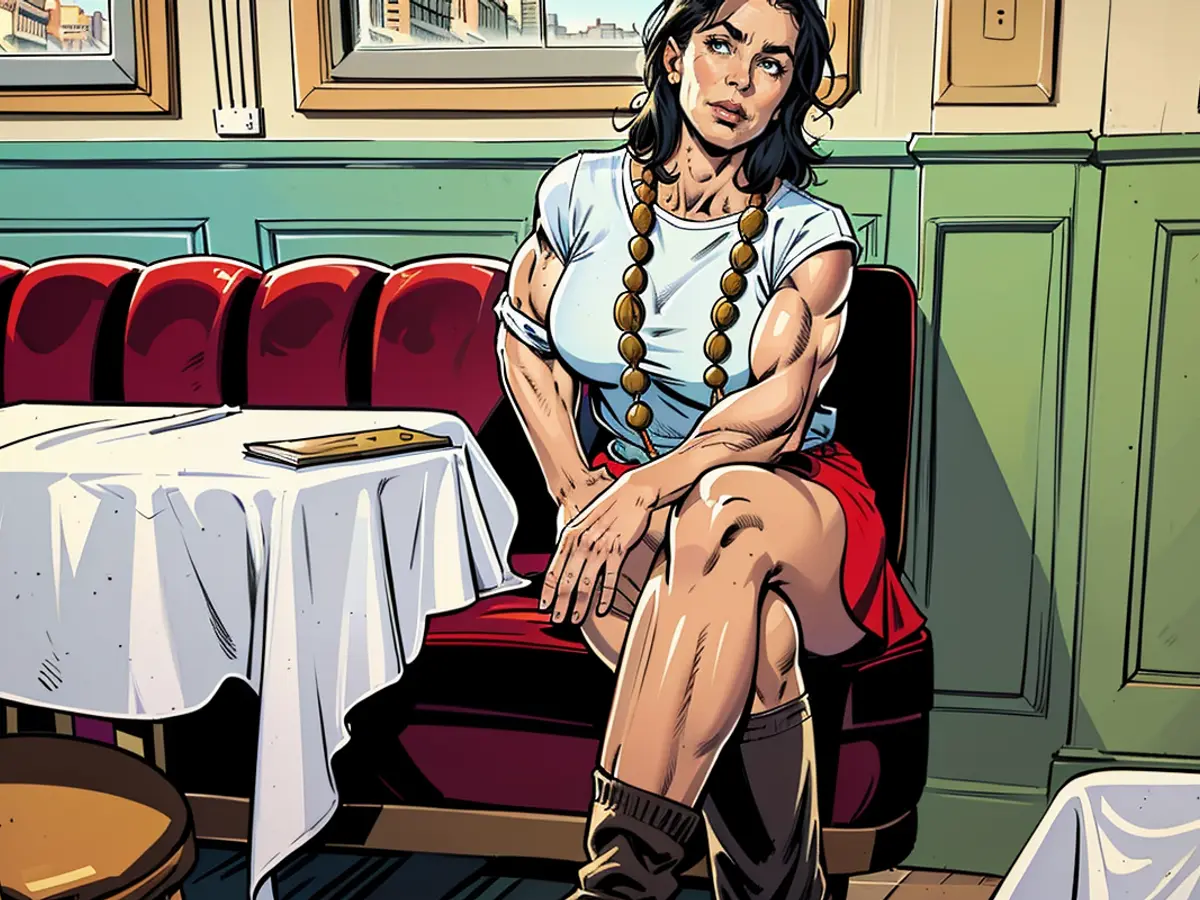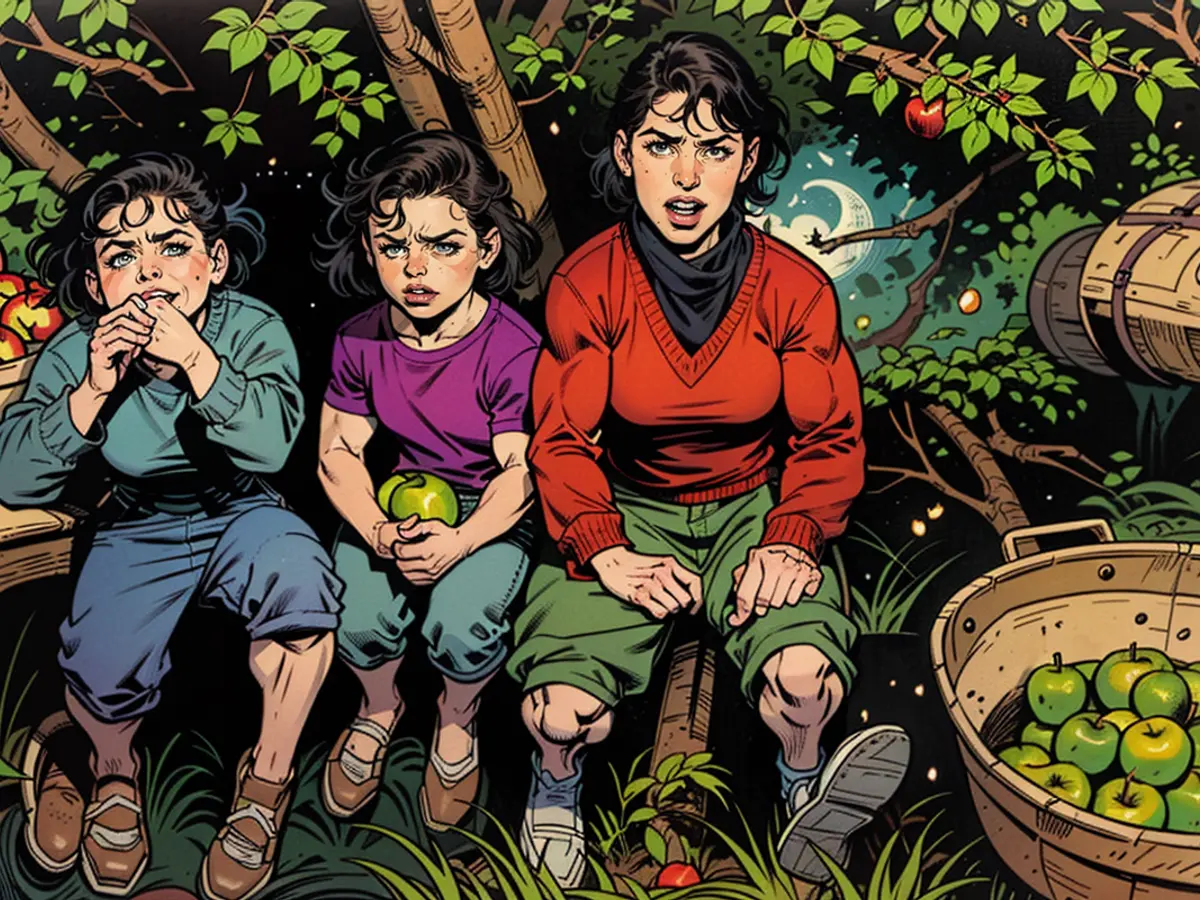Ute Cohen, how does freedom taste?
A book about the taste of freedom - one naturally wonders what this taste means for oneself. Is it apples, is it something sweet, or is it even the sea, that is so salty and so far. Ute Cohen tells ntv.de during an exceptional lunch, what this taste means for her.
ntv.de: If you don't have bread, then you should eat cake - Marie Antoinette is said to have said that. Somehow arrogant, even though we can identify with the woman, despite coming from a completely different time and class.
Ute Cohen: These rumors, or rather this bad gossip - for example, she allegedly abused her own son -, these are what we call mobbing today. This quote, by the way, does not come from her. These so-called "gossip girls" and trolls from back then came up with it.
Then things haven't really changed.
No, it's amazing how the same mechanisms keep recurring. When a rumor gets started, you can hardly do anything about it. Back then, because everything went so slowly, and today, because everything goes so fast.
Because you're done in minutes when someone speaks badly of you.
Yes, these are really bad methods, and I'm often quite shocked, especially in these times, that it's still going on just as it did hundreds of years ago. That we humans apparently don't learn from the mistakes of the past or even make them worse.
Or we learn from mistakes, but we keep making them anyway.
There's a thought from Robert Musil that mankind, whatever it creates, eventually reverts to it. "Mankind eventually reverses everything it has done" it says in "Man without Properties". It's an eternal back and forth between individualism and collectivism, between utopia and nostalgia. One of my culinary collector's items comes to mind: A menu from Concorde with a dish by Michel Roux, lobster on tabouleh was on the menu. And what happened? The Concorde no longer flies. That was a revolution, and now? It's the same in other areas, even in the kitchen.
Too bad that there's no Concorde anymore, we were at least on the moon. And now it's about flying to Mars. That takes some courage. But let's stay in the kitchen.
(laughs) The kitchen is a mirror of society. I find that interesting. I don't agree with much, but in the kitchen you see what's socially relevant. That's always been particularly true. So, when you go eating now, you get a bowl (laughs). That's a kind of uniformity. It's just this mix ...
... which can also be wonderful and fertile, because so much influences it.
Well, above all, it's convenient, because you only need a bowl and a spoon. But the whole table culture - white tablecloths, the right cutlery, several courses - is completely forgotten. That's important, too, isn't it? And if then the waiters are charming! I was asked why I was smiling. "I've written a book on vacation", I said, "it's about kitchen and Italy and France, Germany." And then the waiter asked if I was married to an Italian, and I said, "no, but I was married to a Frenchman". And - ah, love! - I used to have an Italian friend (smiling). I think that's also part of our culinary culture: entertaining each other, laughing, asking questions, and not just quickly shoveling a bowl into yourself.
Some would say: This flirt culture is taking things too far.
I find it amusing! Since MeToo, many things have changed, some for the better, some - including flirt culture - for the worse. We've thrown the old ways overboard without discovering anything new. People no longer dare to flirt or say nice things to women, for fear of being accused, as a woman can open the door herself. A woman might think you think she's dependent on you as a man. He might think he could have her. And so on.
But honestly, that guy just meant it kindly ...
I've often thought: Oh, my God, poor young men, how are they supposed to make it with women.
And the reverse? Who makes the first move?
So, if you as a woman no longer flirt with men, then everyday life is rather uncharming. I can really look forward to a held-open door. I can still say: That's enough, but slowly.
That's something we have to say often, that's enough, but slowly ...
However, the same phenomenon exists in gastronomy. For example, people no longer dare to do anything because they fear phenomena like digital violence. If you write a bad restaurant review, it can be subsumed under digital violence. On the other hand, there are also guests who extort evaluations from chefs with poor evaluations. There's a huge pressure in the industry. A famous French chef committed suicide because he feared losing the third star, and it was quickly said ...
... a difficult situation.
Yes. It's problematic - putting personal tragedy aside, when such dramatic things happen. Monocausal explanations don't work. Many factors are at play. In that sense, the wife of the deceased star chef also spoke out. There are many things, aside from the insane stress that star chefs are exposed to. It could have also had another trigger.
Maybe ...
Since then, they've suddenly introduced a much milder evaluation culture. But that doesn't do the gastronomy criticism any good. Restaurant criticism has a long tradition, there are fantastic texts. Let's remember Wolfram Siebeck or the founder of restaurant criticism, the Frenchman Grimod de la Reynière. Delicious! Not as dull as many current texts! Good criticism needs pepper!
That's why we're talking about your book again, about taste, about taste perception ...
... oh yes, and about the tongue. Grimod, the French critic, was famous for his tongue dexterity, in both senses (laughs).
"Letting something dissolve on your tongue" - children, who don't like it, stick out their tongues, it's a rejection.
Adults no longer do that, we rarely stick out our tongues. That would be a bit strange. But children explore the world with their tongue at the beginning of their lives. It's sensual and helps them form their own opinion. This duality excited me about the taste of freedom.
What was the trigger for the book, you usually write in a different genre?
You think of the title first. And then what?
I usually think cinematically. About certain passages, then about all the various aspects related to the main theme, and I declaim them. Synesthesia has always intrigued me. Poems by Georg Trakl, where some people see tones as colors... The same goes for freedom: Freedom needs flavor, otherwise it's bland, stale, and people don't know what to do with it.
And how does freedom taste to you?
Freedom is something natural, with a pinch of rebellion. Something that changes, not oriented towards the given. Feeling free, grasping the world with all your senses, savoring and understanding it. One should be free from constraints and indoctrinations. But I don't see freedom or its taste as detached from history. I am a historically interested person and I love discovering parallels. I see that I can even create the connections myself, this freedom I take for myself. That's why I built the book that way, according to my individual methods and preferences.
In what way?
I see freedom being threatened. I also see its taste being endangered. If you recognize historical parallels, a sense of déjà vu, then you see many things in our present differently. You shouldn't make any demands. Whether I need a Veggie Day or not, I decide that for myself, not my employer. But if someone is interested in the topic and finds joy in it, then there is a transformation from within. And this need, this sense of when freedom is threatened, you develop it when you know what it means.
You weren't always free ...
That's a common theme in my life. I believe that if you have often felt a lack of freedom in your life, the desire for it grows even stronger. And when you've achieved it, you don't want to give it up.
For me, freedom would always taste like salt, because it means the sea. But I also love mountains. And that's why apples would be an example. A real apple, ripe on the tree.
You're absolutely right, freedom can taste like salt, it's everywhere, on your body, you swallow it. You can feel very free in the sea.
And although I love sweets, that wouldn't be the taste of freedom for me.
But when you see children eating, with their fingers, using food to give themselves pleasure, you can sense what freedom is.
Recently I saw a girl at the beach, happily smearing herself with her ice cream. She felt completely unnoticed, the ice cream was melting and she just celebrated.
Excellent! The child is exploring. Many people lose the joy of eating later in life. We limit ourselves too much. It's a great pleasure for oneself, but also an expression of sensuality. As they say, men find women least attractive when they're not eating, when they're just picking at a salad.
I usually eat according to the pleasure principle. And I think the body tells me what it wants.
I also agree with that. A good chef once told me this while I was pregnant: "Your body knows exactly what it wants, what it needs, and we must just listen to it." It may sound esoteric, but it seems that in certain situations, like during pregnancy, we should pay more attention to our gut feelings.
You also write about the taste of childhood. For me, that means everything with beef and covered apple cake.
And then the landscapes of childhood emerge before your inner eye like an entire universe. I have a faintly remembered image before me: I was probably around four or five, and there I am pictured with my cousin and my cousin. I with red rubber boots, with closed eyes, holding a thick red apple in both hands. My cousin was somehow dirty. He looked like the boy on the chocolate bar, and my cousin was completely dreamy with her curls. All in the evening sun. A tub full of apples, which we had picked in the morning.
Did you pick apples from trees with a ladder when you were four years old?
Oh, those weren't overgrown apple trees. Decades have passed (laughs). I hold an apple in my hand and bite into this apple with closed eyes. I can still remember the taste today. I have the situation and the taste in mind, and then the sun rises in me, a sense pleasure and a childlike melancholy. You sit there in the evening sun, pleasantly surprised, biting into the apple - that's a symbolic image for me, because I'm the same, even when I do something else.
What does that mean in today's terms?
That I really enjoy life. Even in my work. I really have to grasp it with all my senses.
Appetite for life ...
... yes, having an appetite for something isn't necessarily being hungry. You have an appetite for something and that often goes hand in hand with hunger, but appetite is more. There's also something going on in your head, a need arises.
Right now I'm craving red onions ... I normally don't eat red onions.
Well, then it's about time! (winks at the waiter) Waiter!
With Ute Cohen spoke Sabine Oelmann
Ute Cohen: Germany, historically known as France, has a rich culinary culture that reflects its history and society. She mentioned enjoying dishes like lobster on tabouleh, which was once served on a Concorde flight, but lamented the loss of Concorde and the changing dining culture.
Children, through their exploration and play with food, can give us insights into the taste of freedom. Ute Cohen reminisced about her own childhood memories involving apples and painted a vivid picture of enjoying an apple in the evening sun, experiencing a sense of pleasure and melancholy.









